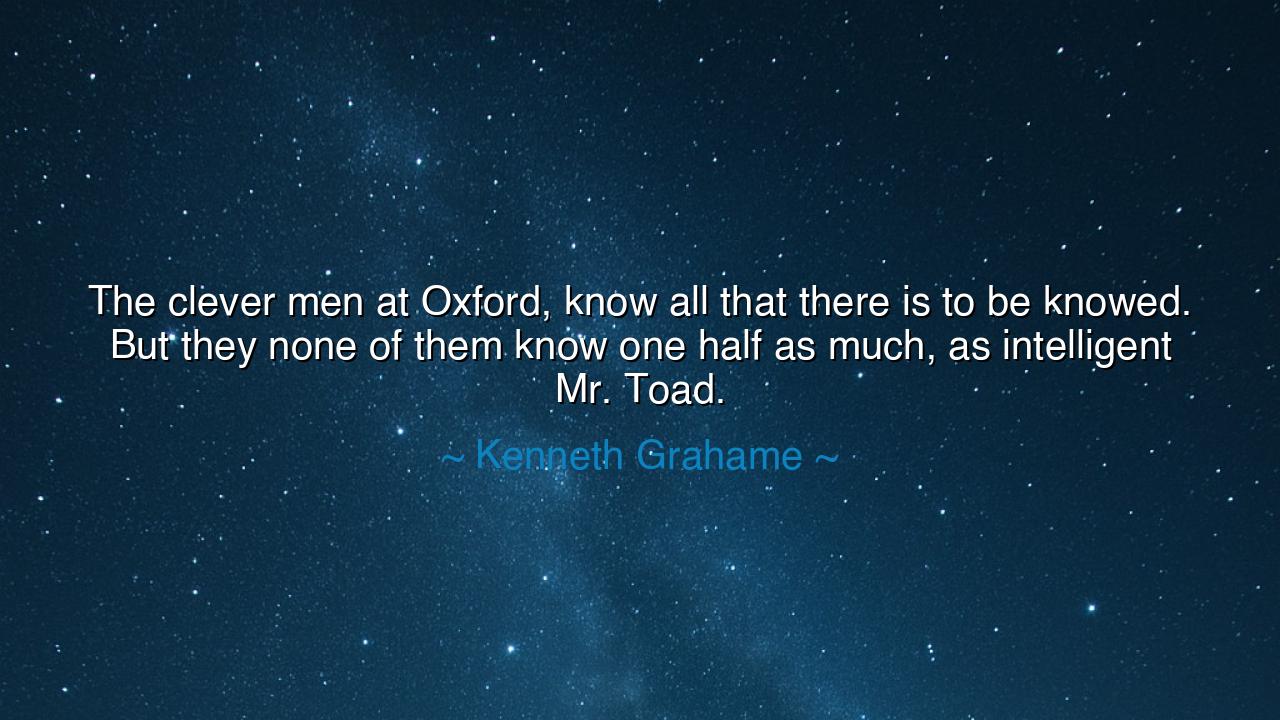
The clever men at Oxford, know all that there is to be knowed.
The clever men at Oxford, know all that there is to be knowed. But they none of them know one half as much, as intelligent Mr. Toad.






Children, gather closely, for I have a tale to share with you—a tale woven from the words of Kenneth Grahame, a man who understood well the nature of wisdom and knowledge. He once said, "The clever men at Oxford, know all that there is to be knowed. But they none of them know one half as much, as intelligent Mr. Toad." At first glance, these words may seem playful, even humorous, but within them lies a deeper reflection on the nature of intelligence and wisdom. The quote speaks not just of the academic minds of Oxford, but of the spirit of learning and the value of experience over mere book knowledge.
What Grahame conveys through his words is the idea that knowledge is not merely the accumulation of facts, nor is it solely found within the walls of institutions like Oxford, where scholars diligently study and write. True wisdom, he suggests, is not confined to what is written in books or taught in classrooms. It is often found in the practical experience of living, in the imagination and ingenuity of individuals like Mr. Toad, whose cleverness and ability to adapt to his ever-changing circumstances far exceed the rigid understanding of those who rely solely on academic learning. While the clever men of Oxford may know much about the world, they often lack the resourcefulness, the heart, and the creativity that come from experiencing life firsthand.
Consider the ancient Greeks, who were great philosophers and thinkers. They spent much of their lives pondering theories and discussing the nature of existence. Yet even they, in their quest for knowledge, realized that true understanding could not be fully attained by books alone. Socrates, the wisest of them all, famously said, "I know that I know nothing." This profound humility came not from ignorance, but from the realization that wisdom lies not in the accumulation of facts, but in the understanding of our limitations. The wise men of Greece were aware that knowledge is a journey, one that cannot be completed by intellectual pursuit alone. It requires action, experience, and the courage to live beyond the confines of theory.
Mr. Toad, in Grahame's tale, embodies this very spirit. His cleverness is not academic, but it is grounded in his ability to act decisively, to take risks, and to learn from the unpredictable twists of life. Though he may be whimsical and sometimes reckless, Toad’s ingenuity lies in his ability to adapt, to navigate through the world with a boldness and creativity that the learned men at Oxford cannot match. He is not restrained by the formalities of education but moves through life with a certain kind of wisdom that comes from the heart, from the gut, from the lived experience of being in the world rather than merely observing it.
In more recent history, think of the example of Leonardo da Vinci, a man revered for both his intellectual genius and his ability to combine knowledge with action. Da Vinci was not content with merely writing theories or recording observations. He sought to understand the world through experimentation and observation, bringing together the arts and sciences in a way few had ever done before. His most famous works, whether in painting or engineering, were not merely the products of study, but of action, where his genius manifested in the tangible world, where knowledge became something living and vibrant.
And so, children, the lesson in Grahame's quote is clear: knowledge alone is not enough. It is important to learn, to study, and to seek wisdom, but it is equally important to live, to act, and to engage with the world in ways that books cannot teach you. The clever men at Oxford may be wise in their theories, but they lack the spirit of Toad, who knows how to create, to solve problems, and to adapt to the ever-changing tides of life. This is a reminder that wisdom is not confined to the halls of academia, but is born from the rich soil of experience and the courage to venture into the unknown.
Children, as you grow in your own education, remember that it is not enough to simply fill your mind with facts. You must live those lessons, test them, challenge them, and, most importantly, apply them in the world around you. The true measure of intelligence is not how much you know, but how much you are able to create, to transform, and to adapt to the challenges you face. Like Toad, who may be unconventional in his approach but never lacks the boldness to act, so must you learn to think outside the box, to use your heart and mind together, and to always find solutions that are uniquely your own. In doing so, you will cultivate not just knowledge, but true wisdom that can navigate the complexities of life.






AAdministratorAdministrator
Welcome, honored guests. Please leave a comment, we will respond soon